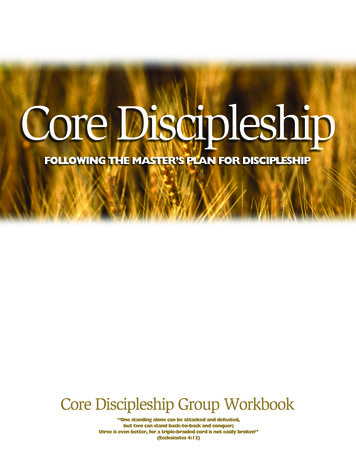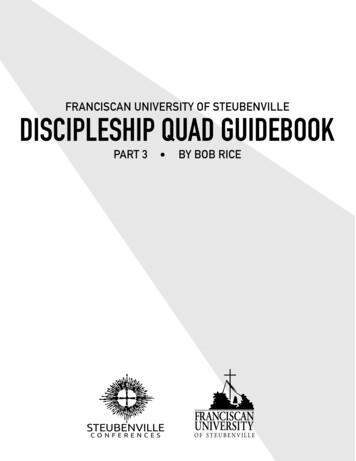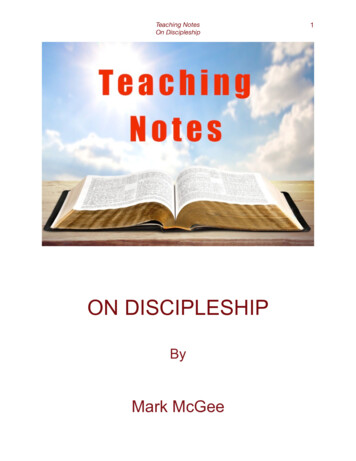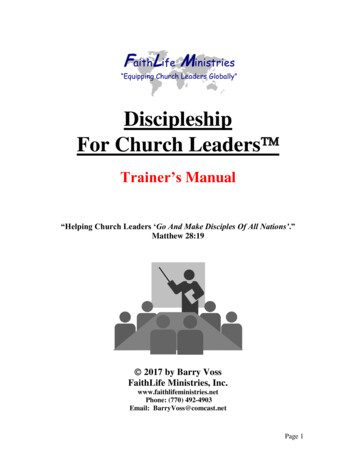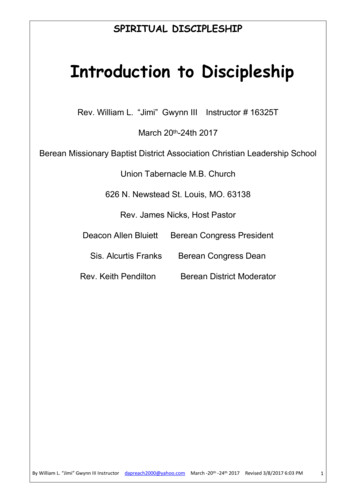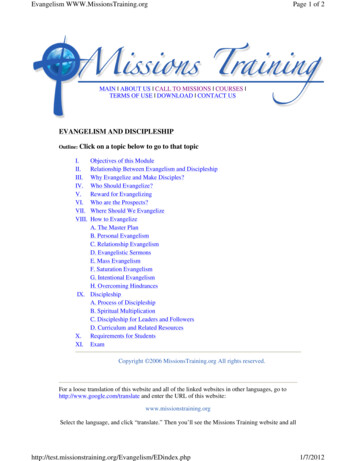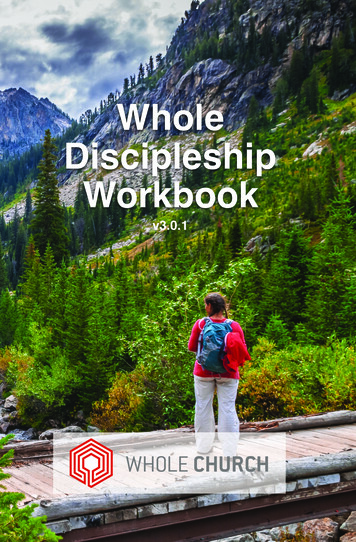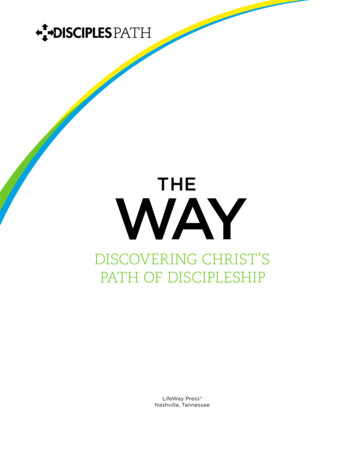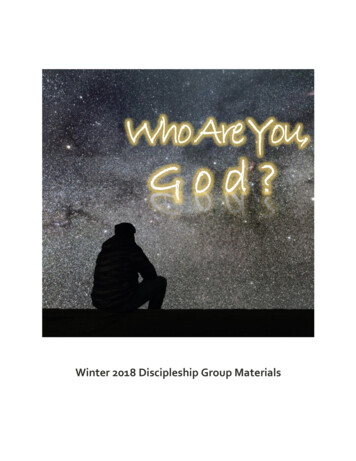
Transcription
Winter 2018 Discipleship Group Materials
ContentsIntroduction1Week 1: Are You Love?5Week 2: Are You Holy?8Week 3: Are You Just?11Week 4: Are You Mighty?14Week 5: Are You Good?17Week 6: Are You More Than We Can Imagine?20Appendix: Recommended Reading212410 Spencerville RoadSpencerville, MD 20868301.421.5949 www.crcc.org
IntroductionIn this cold and bleak season of the year, we will spend six weeks focused on the awesomeGod to whom we belong—the God who is Love, revealed in Jesus; the One who is so muchmore than we could ever imagine! Through this series, we will explore some of thecharacteristics of God found in scripture and experienced in our own lives. The intention is notto advance our learning about God so much as to enrich our experience of God.We will take time to think about words often used of God—holy, just, mighty and good—andwhat these words meant to the writers of the Bible. We will consider how thesecharacteristics were manifested through Jesus’ life in Palestine 2,000 years ago. And we willchallenge one another with the implications for our own lives today.Exploring the characteristics or attributes of God can easily become a theoretical, abstractactivity. While we will fully engage our minds to discuss the meanings of and tensionsbetween various divine characteristics, we also recognize our human limitations. Ourthoughts are not God’s thoughts (Isaiah 55:8-9). By focusing on these themes, we want toenter more into the mystery of God and inspire a sense of worship, rather than trying to distillor dissect God into intellectual categories.Throughout the series we will use the biblical claim that “God is Love” as the lens throughwhich we view other dimensions of God’s nature and character. While holy, just, mighty andgood are adjectives that describe God, in 1 John 4:8 we read that God is not only loving(adjective), God is Love (noun). Similarly, Paul affirms the preeminence of love in chapter 13of his first letter to the Corinthians, which concludes: “And now these three remain: faith,hope and love. But the greatest of these is love.”It would be very strange indeed to spend six weeks discussing the character of someone whowas with us in the room without actually talking to that person directly! In this seriesparticularly, then, we want to ensure time and space during our Sunday services, small groupmeetings, and individually in the week to speak to God and to wait expectantly to hear fromGod.Our prayer is that through this series each of us will grow closer to God, experiencing more ofGod in our everyday lives; and will be inspired to live in ways that better reflect the divineimage within us. We will therefore take time to think through how our understanding of whatGod is like impacts how we live out our lives in practical ways. We will share stories of how wehave encountered and responded to God in different contexts, and we will celebrate themystery of a God who is so much more than we can describe or understand.1
OverviewEach week we will explore an aspect of God’s character. Since we are attempting to deepenour understanding and experience of the same God each week, these different characteristicswill necessarily overlap. We will include in each of the weeks a story about Jesus, or a storyJesus told.The six weeks of the series will cover the following: January 7: Are You Love?The very essence of God is Love, as revealed in the ancient Trinitarian understandingof God as a community of persons held together through interdependent, deferentialrelationship; God invites us to embrace Love. January 14: Are You Holy?God’s holiness can be viewed as awesome beauty and perfection that draws us intointimacy with God and one another, transforming us into healthy, mature andcomplete children of our loving heavenly parent. January 21: Are You Just?God breaks cycles of injustice through love, forgiveness and mercy; champions andprotects the oppressed; and calls us to act in defense of the vulnerable, let go of ourdemands for vengeance, and pursue a way of mercy and non-violence. January 28: Are You Mighty?God is Love—and as love is vulnerable, risks rejection, and allows us freedom, God’s willis not always done. God calls us into partnership, and as we submit our plans to God, wecan trust God to be with us, working all things together for good. February 4: Are You Good?God’s goodness is embodied and defined in Jesus. Immanuel, God “with us” sufferswith us and walks us through our pain; and although we continue to wrestle with ourquestions, God is faithful and trustworthy—and calls us to be the same. February 11: Are You More Than We Can Imagine?We do not need to understand or explain God—we are invited to live as God’schildren, enjoying and exploring God, using our imaginations, and being open to otherpeople’s perspectives and experiences.2
PracticalitiesMessagesIn this packet you will find the discussion questions for each of the first 5 weeks. The questionsassume you have heard the message for that week, so if you were not able to be at Cedar Ridgethat Sunday, please listen or watch the message online (www.crcc.org/messages/) or via theCedar Ridge app.PrayerThe materials for each week include a prayer practice as part of the discussion time. Westrongly encourage you not to rush over that part of your time together as a group. We get toknow someone so much better by spending time with them, rather than from reading andtalking about them!QuestionsAs always, if you have questions or comments on the material in this series, please send themto us at questions@crcc.org.Recommended ReadingThousands of books have been written about the attributes, character and nature of God! Theresources listed in the Appendix represent a very small sample of the many helpful booksavailable. Feel free to share with your group other titles that have been helpful to you indeepening your experience of God.Additional ActivitiesCreative Cup Coffee House – January 20, 7 PMAs our community ponders the justice of God, fittingly, we will also commemorate as a nationthe life of Martin Luther King, Jr. Our annual Creative Cup Coffee House will feature an art showentitled “Breaking Down Barriers,” as well as live music by Africa American social commentatorCrys Matthews. Coffee and dessert will be served at this family-friendly event. This is a greatopportunity to invite family, friends and neighbors to Cedar Ridge.Q&A Session – February 4, 11:30 AMImmediately following the Sunday service there will be a time for open discussion of the topicscovered through this series. Feel free to bring your questions, ideas, and doubts to this informalconversation at the front of the auditorium. If you have specific questions that you would liketo submit in advance, send them to questions@crcc.org.3
Potluck Lunch – February 11, 11:30 AMImmediately after the final service in this series, we will hold a potluck lunch. Please bring adish to share, and plan to stay to make new friends and catch up with old ones!Pancake Dinners—February 13There are no questions for the final week of the series. Instead, we encourage groups to meetfor Shrove Tuesday pancake dinners, and invite neighbors and friends. If you have space foradditional people to join your group that evening, please let us know, and we will post sign-upsonline and in the Commons.Ash Wednesday—February 14, 7 PMWe will gather together on Ash Wednesday to mark the beginning of the season of Lent with atraditional evening service including the imposition of ashes, and periods of reflection andsilence. There will be no childcare, but everyone and all ages are welcome.4
Winter Discipleship Series 2018Who Are You, God?Week 1: Are You Love?We begin this series on the Sunday when we celebrate Epiphany: the celebration of the“manifestation” (the meaning of Epiphany) of Jesus to the world. This sets the tone for thewhole series because as followers of Jesus, our conviction is that if we want to see what God islike, we look at Jesus. The baptism of Jesus is a traditional Epiphany story, and in this story wesee God manifest in a unique way as Father, Son and Spirit. This ancient Trinitarian view ofGod as a community of persons in a loving, interdependent relationship can help us understandand experience God as One who is love, and not just One who happens to be loving. God isLove; the very essence of God is Love, and this is the lens through which we will explore allother aspects of God in the series.Jesus taught and demonstrated love, and we can experience this more—both love forourselves, and also in loving others. In the story of the return of the prodigal son, Jesus uses themetaphor of a loving, vulnerable and distraught father who misses his lost son desperately.Jesus shows us that we belong to God, not because we are owned like some kind of slave toGod, but as God’s children. We are connected to God and to one another as a family isconnected. This is the basis of love: we belong.This week’s discussion questions1. What insights did you gain from the message this past Sunday? What was most helpfulfor you? What was difficult for you?2. Does the concept “God is Love” ring true for you existentially? Is it easy and natural foryou to experience God’s love, or more of a struggle? What factors in your life have ledto this posture?3. Read Mark 1: 9-11. If baptism was for the forgiveness of sins, why do you think Jesuswas baptized? What does this say about God?4. How might the traditional Trinitarian way of viewing God as a community of personsheld together through interdependent, deferential relationship help us see that God isLove? What are the implications of this for our universe (and reality as a whole), theworld around us, and our own personal lives?5
5. Read Luke 15:11-31.a. In what ways do you identify with the son who leaves in this story?b. In what ways do you identify with the son who stays?c. Do you identify at all with the father in this story?d. What does Jesus tell us about God through this story?e. How does Jesus’ view of God here differ from your own?f. How could you reconcile those differences?6. Set aside 10 minutes for this reflective exercise. First read the three passages below. Read them slowly and out loud. Try to takein the mystery and meaning of the words and the reality they speak about. Takeabout 5 minutes for this. Then do the simple breath prayer exercise below. Take about 5 minutes for this.No one has ever seen God; but if we love one another, God lives in us and his love is madecomplete in us. This is how we know that we live in him and he in us: He has given us of hisSpirit. And we have seen and testify that the Father has sent his Son to be the Savior ofthe world. If anyone acknowledges that Jesus is the Son of God, God lives in them andthey in God. And so we know and rely on the love God has for us. God is love. Whoeverlives in love lives in God, and God in them.1 John 4: 12-16 (NIV)“My prayer is not for them alone. I pray also for those who will believe in me through theirmessage, that all of them may be one, Father, just as you are in me and I am in you. Maythey also be in us so that the world may believe that you have sent me. I have given themthe glory that you gave me, that they may be one as we are one— I in them and you inme—so that they may be brought to complete unity. Then the world will know that yousent me and have loved them even as you have loved me.”John 17: 20-23 (NIV)For all who are led by the Spirit of God are children of God. For you did not receive a spiritof slavery to fall back into fear, but you have received a spirit of adoption. When we cry,“Abba! Father!” it is that very Spirit bearing witness with our spirit that we are children ofGod.Romans 8: 14-16 (NRSV)Prayer ExerciseIn this simple breath prayer exercise we will make room for the Spirit to “bear witness withour spirit that we are children of God.” Sit comfortably with your back straight, feet planted on the floor, arms relaxed andhands supported in your lap. Close your eyes and relax your shoulders.6
To begin, listen to your breath as you breathe. Feel your breath in your nostrils,chest and abdomen, inhaling and then exhaling fully and deeply—hold your exhale abit longer than usual to completely expel air. This has a very soothing, cleansingeffect. Breathing accompanied by prayer will also help you to “wake up” and“breathe in” the love of God as you calm your mind, heart and body. As you breathe, imagine the room filled with God’s love for you. Imagine you arelike a sponge in a vast ocean. God is all around you and God is in you. You are in Godand God is in you. Take a few moments to get used to this. Allow yourself to feelGod’s presence and passionate affection for you. As you breathe in, breathe in God’s love. As you breathe out, relax into this love.With each in-breath imagine yourself being filled more and more with God’s love.With each out-breath relax deeper and deeper into this love. Don’t resist it butsurrender to it. If your thoughts stray or you begin to feel unloved, just becomeaware of your breathing again, and focus on breathing in God’s love.Practice during the week:Take 10 minutes each day this week to repeat the exercise above.7
Winter Discipleship Series 2018Who Are You, God?Week 2: Are You Holy?“Holy” is a word that is used often in scripture, as well as in hymns and other religious songs.But it is a term we rarely use in everyday life, and when we do, it is generally in a derogatory“holier than thou” sense. Holy means separate, or set apart—and for some of us, the holinessof God conjures up images of an austere authority figure: an unapproachable king ruling fromon high, perhaps; or a judge who is displeased with our performance. And yet Jesus—the exactrepresentation of God’s being (Hebrews 1:3)—is God with us, one of us, and a friend of sinners.The Jewish people understood that God was so much “more” than the creaturely idols ofsurrounding cultures; and that they were called to be special, reflecting the just, merciful andloving nature of God. In the stories of the Jewish people’s experiences of God—and much morefully in the life of Jesus—we find holiness presented as being dedicated to God; belonging toGod as children of an all-loving parent. We see in the gospels how the holiness of Jesus is notcontaminated by people’s brokenness, but brings wholeness and healing to such people. Farfrom making God unapproachable, holiness invites us to join God in a loving, life-giving andinclusive relationship. It is from this oneness with God and others that we experiencetransformation, learning to love even our enemies, and to be salt and light in our homes,neighborhoods, and society.This week’s discussion questions1. What struck you about the message on Sunday? What did you find most helpful? Whatwas most difficult or challenging?2. What does the word “holy” mean to you?a. When you read or sing that God is holy, how does this make you feel? Whatimages does it conjure up?b. Do you think of yourself as holy? Why or why not? What do you think a holyperson is like?3. Read Isaiah 6:1-8. Isaiah’s vision of God includes Jewish religious imagery, such as atemple, smoke, and an altar.a. What might this imagery have communicated to Isaiah?b. How does Isaiah respond (in v5 and in v8)? Why do you think he responds inthese ways?8
4. Read Matthew 21:12-17. In this second story about a temple, merchants (selling animalsfor sacrifices, and changing money for the payment of the temple tax) had set up shopin the Court of the Gentiles—the only part of the temple grounds open to non-Jews.a. How would you describe Jesus’ actions in this story?b. Why do you think Jesus acted this way?c. Why were the priests so indignant?d. What might this story tell us about Jesus’ view of holiness?5. In the description of the death of Jesus in Matthew’s gospel account, we have anotherreference to the temple in Jerusalem:And when Jesus had cried out again in a loud voice, he gave up his spirit. At thatmoment the curtain of the temple was torn in two from top to bottom.Matthew 27:50-51 (NIV)The curtain hung in front of the “Holy of Holies,” where God’s presence was believed todwell, and which only the High Priest could enter once a year after meticulouspreparation.a. Why do you think the writer of Matthew’s gospel included this in his account?b. What does it tell us about God’s holiness?6. There is no record in the gospel accounts of Jesus talking about holiness, but he doesteach about the need to be different or set apart for God in the Sermon on the Mount.Read Matthew 5:13-17 and 43-48.a. What does this passage reveal about Jesus’s attitude to the Jewish law?b. How are we called to be “set apart”? What does this look like in your own life?c. What do you think it means to be “perfect”?d. In what areas of your life do you want to become more “perfect”?7. Set aside the next 10 minutes to focus on the holiness of God. Read the followingslowly, taking time between each step. Sit comfortably, with your back straight and your feet flat on the floor. Becomeaware of your breathing: breathe slowly and deeply, filling and emptying yourlungs completely. Quiet your mind: let go of any tensions, worries and distracted thoughts.Physically relax your muscles. Picture God’s holiness as being like the sun in a clear blue sky—bright and warm.Feel the warmth on your face and arms. Welcome God’s light into every part of your being. Allow yourself to bask in theholy, healing love of God.9
If there are relationships, situations or concerns weighing on you, open them upto God’s holy light. As you breathe, inhale God’s holiness; exhale any guilt, anxiety or striving. Ask God to help you on your journey to wholeness.8. How do you feel as a result of this exercise? Is there anything you want to share with thegroup?Practice during the week:Set aside 10 minutes each day this week to repeat the exercise above.10
Winter Discipleship Series 2018Who Are You, God?Week 3: Are You Just?Humanity seems to have an innate sense of justice. We have all been treated unjustly, and wefeel that very acutely. We have also seen injustice dealt out to others, and we are often stirredto speak up and act. But we are each perpetrators of injustice, too. We have treated othersunfairly in personal ways, and often we are complicit in systemic injustice through our silenceand through our cooperation with such systems when they benefit us. Sometimes even ourreaction to injustice can lead to anger, violence and judgment that itself becomes anotherinjustice.This week we consider God as “just.” God’s nature is to break this cycle of injustice throughlove, forgiveness and mercy. God is a champion and protector of the oppressed, who hears thecries of the subjugated, and who calls us to act in defense of those who cannot defendthemselves. We recognize that life is often not at all fair, and that a large part of striving for amore just world requires us to let go of an expectation or demand for vengeance (that kind ofbalancing of the scales of justice) and to pursue a way of mercy and non-violence.This week’s discussion questions1. What insights did you gain from the message this past Sunday? What was most helpfulfor you? What was difficult for you?2. Read the following passages and discuss what they say about God’s nature, and whatthe implications are for our own lives:a. Deuteronomy 10:17-18b. Exodus 2:23-25c. Micah 6: 6-83. The speaker on Sunday suggested that overall injustice eventually destroys itself, citingthe rise and fall of empires throughout history. Do you agree with this? Do you thinkultimately justice prevails?4. Read the story Jesus tells in Matthew 18:21-35a. There are two servants in this story. How do you identify with each one andwhy?b. In what ways is this story unfair? In what ways is it fair?c. What does this story say about Jesus’ view of justice?11
5. Read the following two quotes:Here’s another old saying that deserves a second look: ‘Eye for eye, tooth for tooth.’ Isthat going to get us anywhere? Here’s what I propose: ‘Don’t hit back at all.’ Ifsomeone strikes you, stand there and take it. If someone drags you into court and suesfor the shirt off your back, giftwrap your best coat and make a present of it. And ifsomeone takes unfair advantage of you, use the occasion to practice the servant life.No more tit-for-tat stuff. Live generously. You’re familiar with the old written law,‘Love your friend,’ and its unwritten companion, ‘Hate your enemy.’ I’m challengingthat. I’m telling you to love your enemies. Let them bring out the best in you, not theworst. When someone gives you a hard time, respond with the energies of prayer, forthen you are working out of your true selves, your God-created selves. This is what Goddoes. He gives his best—the sun to warm and the rain to nourish—to everyone,regardless: the good and bad, the nice and nasty. If all you do is love the lovable, doyou expect a bonus? Anybody can do that. If you simply say hello to those who greetyou, do you expect a medal? Any run-of-the-mill sinner does thatJesus in Matthew 5:38-48 (The Message)Nonviolence is the answer to the crucial political and moral questions of our time: theneed for man to overcome oppression and violence without resorting to oppression andviolence. Man must evolve for all human conflict a method which rejects revenge,aggression and retaliation. The foundation of such a method is love.Dr. Martin Luther King during his acceptance speech for NobelPeace Prize in Stockholm, Sweden on December 11, 1964a. In what ways are these quotes similar? In what ways are they different?b. What are some situations in your own personal life where you need to practicemercy triumphing over judgment (James 2:13)?6. How can we work collectively to embody this form of justice and respond to injustice inour society?7. Take some time to pray for one another and for our church to respond effectively andlovingly to injustice in our society.Practice during the week:This week look out for specific ways where you can practice mercy triumphing over judgment. At the beginning of each day take a moment to invite God to awaken you to yourreactions to unjust treatment.12
Throughout the day be deliberately conscious of your interactions and responses withothers. Each time you feel harshly spoken to or treated, take a moment to breathe inGod’s love and mercy. Hold back on your response for a while. When you are more settled consider whatwould be a merciful and loving response. This does not mean ignoring any wrongdoing.It might mean you challenge the behavior but in a loving way, or you might choose tosay nothing. Either way, respond from a center of love and forgiveness, rather thanvengeance. For each situation, consider an act or spoken word of kindness to that person that theyalmost certainly don’t deserve. Having considered it, do it before the end of the day.13
Winter Discipleship Series 2018Who Are You, God?Week 4: Are You Mighty?We believe that God is beyond time and space, powerful, all knowing, and infinitely wise. Yetscripture also portrays God as vulnerable: desiring a relationship with us, and longing for thelove bestowed on us to be returned. God offers God’s self to us, coming as a servant, whosuffers with and for us. God chooses to partner with us in the work of reconciling all things, andwe are entrusted to be God’s ambassadors, acting on God’s behalf. In the life, death andresurrection of Jesus, we continually see this divine tension between miraculous power andsacrificial love. God is Love, and love does not force its way. Love is vulnerable; it risksrejection; and it allows freedom and choice.When we say that God is “in control” it cannot therefore mean that God get’s God’s own wayall the time, or that God micro-manages all the decisions and activities of each person onearth. God calls us into partnership: we have a responsibility to live a life of love, in accordancewith what God has shown us through Jesus; and to submit our plans to God, being open toGod’s guidance, and asking—as Jesus did—that God’s will, not ours, be done. Living in such away, we can be confident that God is with us in every circumstance, and that the wisdom ofGod will work all things together for good.This week’s discussion questions1. Did you practice “mercy triumphing over judgment” this week? How did that go? Isthere anything you want to share with the group?2. What struck you about the message on Sunday? What did you find most helpful? Whatwas most difficult or challenging?3. When you think of God, do you more naturally think of a God who is powerful, or a Godwho is vulnerable? Why do you think that way?4. The speaker on Sunday said that “God is in control” cannot mean God makeseverything happen according to God’s will. Do you agree or disagree? What incidents inyour life have led you to believe that God is (or is not) in control?5. Read Luke 22:39-53.a. In what ways is Jesus in control in this story?b. In what ways is Jesus not in control?14
6. Read the following verses and discuss what it means for God to have a plan for our lives:a. Jeremiah 29:11b. Micah 6:8c. Acts 16:6-107. Read Luke 11:1-13.a. Why do you think Jesus instructs his disciples to pray that God’s kingdom wouldcome?b. What do you think is the point of the (somewhat humorous) story of theshameless friend?c. What does the comparison between an earthly father and our Heavenly Fatherteach us about prayer?d. In what ways do you think prayer illustrates partnership between God andpeople?8. How does thinking of God as being in control help us to pray? How does thinking of Godas not being in total control of everything give more urgency to prayer?9. Take time to pray for anyone in the group in particular need of God’s guidance.a. Have the person share briefly about the situation.b. Pray for God’s peace and wisdom in this situation.c. Sit silently for 5 minutes, opening your heart and mind to God’s Spirit.d. Pray that God’s will would be done in this situation.e. If thoughts, images or feelings came to you during the time of silence that youthink might be from God, share them with the group with humility—recognizingthat we can all be mistaken. Be careful to only share what you experienced,rather than trying to interpret it for anyone. Above all, before you sharesomething, ask yourself: “Is this love?” If it is not, let go of that thought orfeeling.Practice during the week:Each morning this week, think through all you need to do in the upcoming day. Identify the things that bring you pleasure: thank God for those things, and ask God tohelp you sense God’s presence in them. Identify the things that may be difficult for you: ask God to help you act lovingly inthose situations, and to be aware of God’s presence with you in them.15
Each evening this week, think through the activities of the day. Think about the times in the day when you experienced God’s presence. Whathappened, and how was God present? What did you do that enabled you to experienceGod? Think about any times in the day when you were resistant to God’s presence. Whathappened, and how did you resist? How could you have thought or acted in a way thatwould have embraced the reality of God’s presence, and channeled more love into thesituation? Ask God to help you be more embracing of God’s presence tomorrow.16
Winter Discipleship Series 2018Who Are You, God?Week 5: Are You Good?Scripture is full of statements that God is good, but we live in a reality that does not always feelfriendly or safe. We all wrestle with the question of how a good and powerful God can allowbad things to happen, and we struggle to trust in God’s goodness in the midst of suffering.Jesus is the one who embodies and defines the goodness of God. We see in Jesus a God who isfaithful, trustworthy, and healthy. And Jesus calls us to live the same way.During his life on earth, Jesus experienced great emotional and physical pain. The incarnation,God “with us” (Immanuel), does not explain the origin of evil and suffering, but it does provideus with a way of viewing suffering. Rather than try to seek a contrived, objective “explanation”for suffering, or to understand suffering as God’s will, we find comfort and strength in God’spresence with us in our pain, experiencing it with us and walking through it with us.This week’s discussion questions1. What insights did you gain from the message this past Sunday? What was most helpfulfor you? What was difficult for you?2. Is the goodness of God an easy concept for you to accept or more of a struggle? In yourview, is the universe essentially friendly or hostile? What life experience has led you tothis perspective?3. How does this week’s theme (God is Good) speak to last week’s theme (God is Mighty)?Historically, in the Christian tradition, God has been viewed as all-powerful andcompletely good. What tensions does this create? How might we resolve thesetensions?4. Read the following passages and discuss what they mean with regard to the goodnessof God.a. Genesis 1:31b. James 1:17c. Psalm 100d. Psalm 145: 13b – 1617
5. In the message on Sunday, the speaker did not present an explanation for evil andsuffering in the world, but rather suggested an approach that involves i) working toalleviate suffering wherever we are, and ii) seeing God not as the cause of suffering butsubject to it, and with us in it.a. What is your response to this approach?b. Are there more helpful ways to understand and walk through pain andsuffering?c. How could we develop deeper trust in God as good?6. Read the story about Jesus in Luke 7:36-50.a. In what ways do you identify with the woman?b. In want ways do you identify with Simon the Pharisee?c. In what ways does Jesus demonstrate goodness in this story?d. What are some ways you need to be more like Jesus in this regard?e. How might the character of Jesus in this story help us trust more deeply
Winter Discipleship Series 2018 Who Are You, God? Week 1: Are You Love? We begin this series on the Sunday when we celebrate Epiphany: the celebration of the “manifestation” (the meaning of Epiphany) of Jesus to the world. This sets the tone for the whole series because as followers of Je
